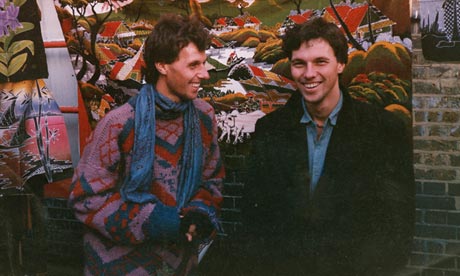
Our culture's fascination with the unreliability of memory is borne out by the popularity of amnesia-themed films (Memento, Eternal Sunshine of the Spotless Mind) and novels (SJ Watson's Before I Go to Sleep). Radio 4 recently selected Present Permanent Tense, the story of the "man with no memory" Henry Molaison, as its book of the week; there is something about the subjectivity of recollection that intrigues and unsettles us.
Memory is what any autobiography relies on – the reader needs to know that the author is, if not in possession of the true facts, then at least honest enough to state this. Such honesty is the initial draw of Tell Me Who I Am, which starts with Alex Lewis's confession that he spent most of his life not knowing the full extent of the trauma in his childhood. After a motorcycle accident in 1982, 18-year-old Alex awoke from a coma to find his entire life's memories erased. He remembered nothing and recognised nobody – except his identical twin, Marcus. Alex depended on Marcus to supply him with the memories he needed in order to appear normal, but he remained physically and emotionally damaged – "he was confused all the time and agitated … if the tension became too much, he simply lost consciousness".
The unnervingly close bonds we associate with twins have made them a well-used literary device, one that has endured from the earliest myths through to modern fiction (Audrey Niffenegger's Her Fearful Symmetry). Here, the "twin thing" adds a new dimension to what could easily have been a standard misery memoir – the story of Alex and Marcus's unhappy upbringing at the hands of an eccentric, self-promoting mother and seething bully of a stepfather. The twins were treated as servants by their wealthy yet miserly parents, made to sleep in a damp shed and denied a front-door key to their home well into adulthood. The boys escaped and overcame severe dyslexia to adapt to life on cruise ships, hotels and construction sites, eventually building a dream resort on a Tanzanian island. It's highly unlikely they would have managed such feats without each other's support.
The escape and subsequent adventures, however, were "shot through with something bleaker" – namely, Alex's increasing suspicion that his brother had not told him the full story of their childhood. Following a visit to a spiritual healer, and several disturbing out-of-body experiences, Alex infers that his mother and not their terrifying stepfather was the true villain of his and his brother's early years. When confronted, Marcus confirms this, but refuses to give details of the terrible treatment to which the twins and their younger brother, Oliver, were subjected. It is only years later, when Marcus has a vivid flashback of his own, that Alex realises he and his twin were repeatedly sexually abused, both by their mother and the various men to whom she "passed" her sons.
Ghostwriter Joanna Hodgkin structures Alex and Marcus's story around this revelation, but she ends so many chapters on cliffhangers – "doubts and unease that never quite went away"; "he had to know the truth" – that the reader begins to believe another aspect of the story is to be revealed. Marcus's gradually uncovered memories are harrowing – "I could see a man who had done … unbelievable things to me … I was so frightened that I peed myself" – and deserve a different framework than crime-thriller-style tension-ratcheting.
Telepathy is a staple when it comes to stories about twins. On several occasions Marcus, despite claiming to be dismissive of "any of that mumbo jumbo", correctly predicts when others are in danger. Most of us will, of course, see coincidence rather than magic at work here – the twins might have been able to find each other randomly while travelling in New Zealand, but they seem to have been blind to each other's emotional states for large portions of their lives. It's also hard to know which tricks of the mind to attribute to genuine amnesia and which to "psychogenic amnesia", where the brain blocks out traumatic events. Marcus says that Alex lost his memory "legitimately and I lost it voluntarily" – but it seems significant that Alex's memory loss permitted him to recognise only his fellow victim and not his abuser.
Like memory itself, Alex and Marcus's story is at times inconsistent and repetitive. The twins clearly have many reasons to despise their parents, and the victim card is not played as relentlessly as in other memoirs, but the constant mentions of the twins' funny and likable nature stretches credibility. Hodgkin also fails to avoid cliche – the surfacing of trauma is compared to a "dam bursting" – and banalities are common: "their childhood affected them but they refused to let it dictate the course of their lives". That the twins are able to tell their story is testament enough to their resilience, and their survival owes a great deal to the support having a twin can provide. The most wrenching admission regarding the abuse comes from their younger brother, who tells the twins he'd always believed he had been the lone victim.
How we respond to this book depends on whether we can reconcile ourselves, as the twins have done, to never knowing the full story. Some readers will simply find its telling too nebulous. Those, however, who are open to narratives skewed and fragmented by memory might find its meandering style to be an accurate echo of life, with its multiple confusions.

